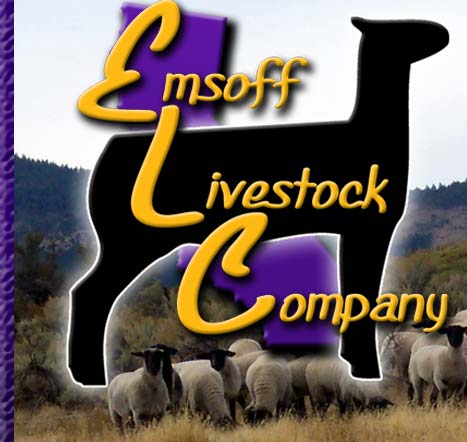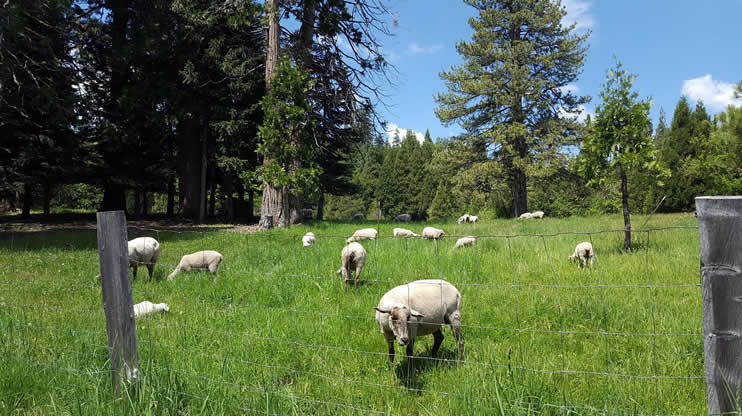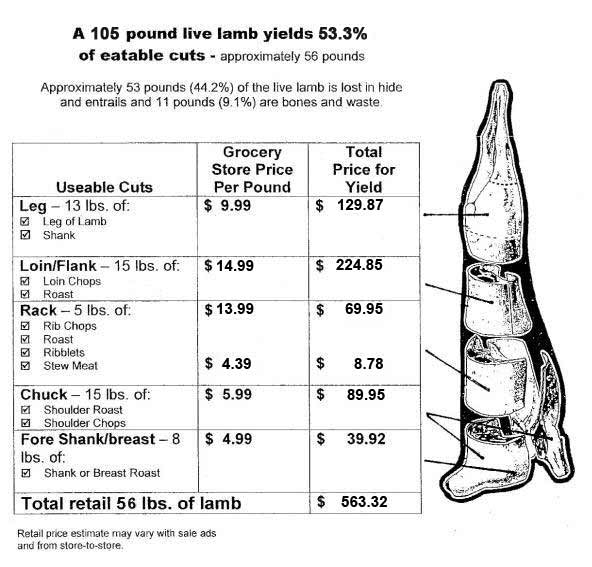
In addition to show lambs, we also raise high quality, sustainably raised butcher lambs. Using primarily Dorper genetics, our lambs are grown on pristine Sierra Nevada mountain meadow pasture near Graeagle, California and then finished on locally grown hay, brewers mash and grain.
Why Dorper? The Dorper sheep is a very hardy, heavy muscled breed that thrives under grassfed management. They are a hair breed not raised for wool, so all selection pressure has been placed on meat production characteristics. They produce an abundance of milder flavored, high quality meat that has become prized around the world.
How does Emsoff Livestock Co. lamb compare to store bought lamb?
Wholesome
You can rest assured that you are getting safe, wholesome meat when you purchase a lamb from Emsoff Livestock Co.
- We never use growth hormones or growth stimulants.
- Our lambs are never fed antibiotics or treated on a routine basis.
- Our lambs graze native grass and clover pasture that are never treated with pesticides.
- Lambs are then finished for approximately 30 days on a healthy, balanced ration of locally grown alfalfa, grass hay, California-grown rice and brewers grain from local microbreweries. This non-fermented grain is what is left over after the starches are seeped out to make beer. It is high in both protein and energy and makes a very nutritious feed for livestock. The rice we feed is grown on Northern California farms and is either broken or not fully mature for the food market. It makes an excellent, healthy energy source for finishing lambs.
Quality
Our lamb is the highest quality available. Compared to lamb sold in retail markets, ours are:
- Younger (often 2-4 months younger than average), which means they are more tender and milder flavored.
- Heavier muscled, which means more and bigger cuts of meat.
- Bringing customers back for more! The number of repeat costumers we have each year testifies to the quality of our lambs.
Value
Not only do you get the highest quality meat available, you also get real value. Our 2018 lamb price is $2.50/lb.
- A 105 lb lamb will cost $262.50. If you choose to have your lamb processed by a local butcher, this will cost about an additional $90, for a total cost of $352.50. The same amount of meat (though inferior in quality and from an unknown source) will typically cost in excess of $550 purchased in a retail market. See the diagram below for a breakdown of this information, including how much meat you can actually expect from a 120 lb. lamb.
*Diagram based on actual 2017 retail lamb prices.
Convenient
Purchasing a butcher lamb from Emsoff Livestock Co. is easy.
- When your lamb is ready to be harvested, you can decide to process it yourself.
- Or for your convenience, we can arrange for a local butcher to have the lamb slaughtered, cut and wrapped for you. All you have to do is pick up your boxed, frozen meat a week later, cut just how you want it.
- Not sure you want a whole lamb? No problem. We can arrange with another buyer to split a lamb with you.
Sustainable
We strive to raise our lambs as sustainably as possible, meaning our sheep are good for the environment!
- Our sheep graze native grasses, forbs and shrubs year round. They are a vital part of controlling sagebrush and weeds on our ranch!
- In the winter the breeding flock is supplemented with locally grown hay and brewers grain from local micro-breweries. Feeding brewers grain is not only good for our sheep, it also keeps it out of landfills and recycles it back into the soil as manure!
- We are predator friendly. We recognize the important role native predators such as coyotes, black bears and mountain lions play in our local ecosystem. Rather than routinely shooting, trapping or poisoning the abundant predators on and around our ranch, we take a more proactive approach, utilizing livestock guardian dogs and night penning to keep our sheep safe.
- Manure is recycled back into the farm. What falls on the pastures stays there. What falls in the barn is collected and spread back out on the pastures to build soil fertility.
Humanely raised
Our sheep are always treated humanely, from birth to harvest.
- All sheep have free access to the outdoors at all times. Lambs are born in the barn to protect them from the elements of weather as well as predators. The breeding flock spends the remainder of the year on pasture and lambs are moved to pasture as soon as they are strong enough to keep up with the flock. Pens are large to allow free exercise when sheep are not on pasture.
- Gently handled. We love our sheep and we know that stress decreases productivity. Our sheep are always handled gently and calmly to minimize stress.
- Tail docking and castration are both necessary for the health and safety of sheep. Docking is absolutely essential as undocked lambs will soil their wooly tails and rumps, inevitably leading to painful and potentially deadly fly strike. Flies lay their eggs in the soil and the hatching maggots literally eat the sheep alive. Fly strike really is as gruesome and painful to the sheep are it sounds. Tail docking is extremely effective in eliminating this horrible condition. Castration is done to prevent inbreeding and to eliminate the danger of rams becoming overly aggressive toward and injuring one another. We utilize an elastrator to dock and castrate our lambs shortly after birth. This device applies a small rubber ring around the tissue, cutting off the blood supply, causing it to go numb within minutes and eventually falling off.












